May 25, 2025 | 10:52 GMT +7
May 25, 2025 | 10:52 GMT +7
Hotline: 0913.378.918
May 25, 2025 | 10:52 GMT +7
Hotline: 0913.378.918
The first 4-star OCOP mushroom farm in Dak Lak is grown organically. After being harvested, mushroom embryos are composted as plant fertilizer according to a circular model.
The farm of Thanh Dong Green Food Joint Stock Company (Buon Ma Thuot City, Dak Lak province) has an area of 5 hectares, of which 6,000 square meters are used for growing mushrooms. This is considered the largest mushroom farm in the Central Highlands today. In particular, this business operates on a circular model. After being harvested, all mushroom embryos are composted as organic fertilizer for the surrounding gardens.
According to Mr. Doan Xuan Truong, Director of the Company, the business also transfers mushroom embryos to localities and grows mushrooms to provide food.
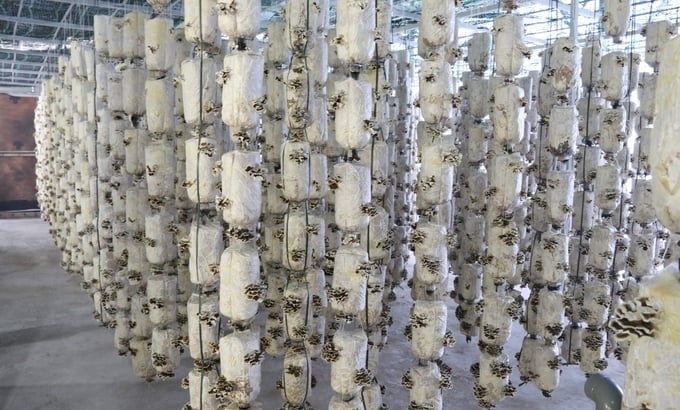
Mushrooms grown in the off-season grow well and yield high yields on the farm. Photo: Quang Yen.
Before constructing a mushroom-growing model in 2020, businesses proactively sought out the Institute for Research and Development of Edible and Medicinal Mushrooms (Vietnam Academy of Agriculture) to get experts to share their experiences and technical instructions and production processes for medicinal and edible mushrooms.
After receiving advice, the business invested in 6 mushroom farms. For mushrooms to grow well and yield high yields, mushroom houses are invested in mist irrigation systems and closed insect screens. In particular, the solar mushroom drying equipment uses convection hot air drying technology, and the drying temperature remains stable, helping maintain the mushrooms' medicinal content.
According to Mr. Truong, the business wants to provide the market with products and services of optimal quality, bringing customer satisfaction to the highest level, so it has invested methodically. This is considered one of the first models deployed on a large scale and with methodical techniques in Dak Lak province and the Central Highlands, combining clean food production and energy.
The mushroom embryo production area is also invested in modern equipment such as an electric boiler, mushroom embryo steaming chamber system, and mushroom embryo packing machine system... to ensure a production capacity of 1.6 - 2 million mushroom embryos/year.
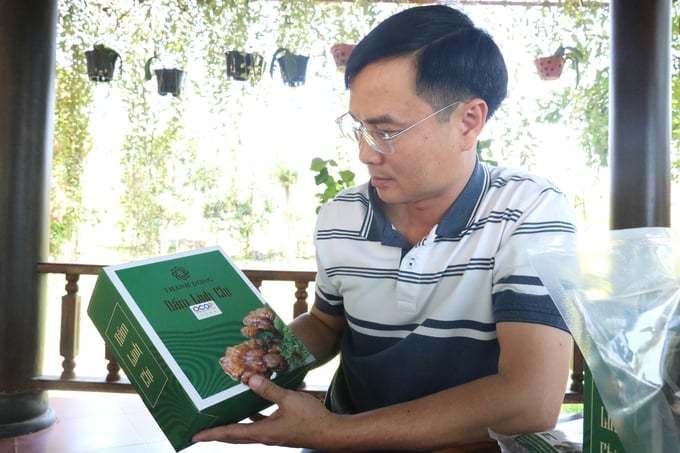
Ganoderma lingzhi - one of two 4-star OCOP products of Thanh Dong Green Food Joint Stock Company. Photo: Quang Yen.
Thanh Dong Green Food Joint Stock Company grows mushrooms such as lingzhi, Monkeyhead, Wood-Ear, and abalone... The company's products have also achieved ISO 22,000 and VietGAP certification. In 2022, the company's Wood-Ear mushrooms and lingzhi mushrooms have been recognized as 4-star OCOP, and abalone mushrooms and oyster mushrooms have been certified as 3-star OCOP.
To have year-round products to supply to the market, Thanh Dong Green Food Joint Stock Company is experimenting with off-season cultivation of Turkey tails mushrooms, Wood-Ear mushrooms, and monkeyhead mushrooms. These are mushrooms with high value, nutrition, and significant market demand. Off-season trial planting in the dry season aims to meet partners' needs when requested.
To facilitate and improve productivity, the farm of Thanh Dong Green Food Joint Stock Company is mechanized and uses automatic systems managed by software installed on the phone from input to output.
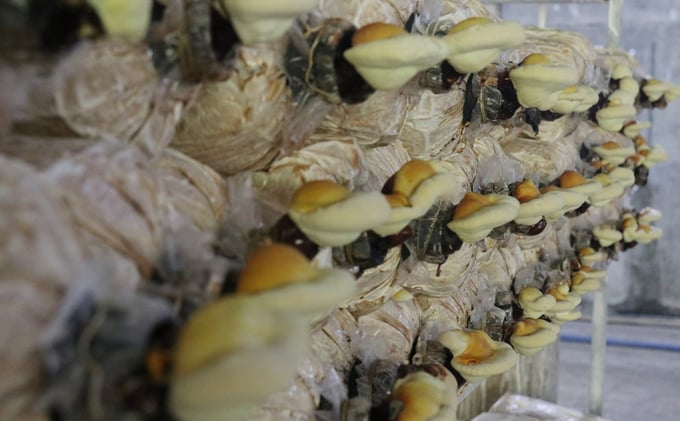
Ganoderma lingzhi is grown at Thanh Dong Green Food Joint Stock Company. Photo: Quang Yen.
This business's model of growing mushrooms under a solar roof has become effective thanks to systematic investment in factories, technology and techniques. In particular, the model has dual benefits because it has both revenue from electricity and electricity to serve agricultural production, creating quality products.
Revenue from mushrooms brings the company VND 3 - 5 billion/year. More importantly, the enterprise has created stable jobs for 15 local workers with more than VND 5 million/person/month income.
Mr. Truong said that the company's products are oriented towards green and circular products. After being harvested, the mushroom embryos will be composted as organic fertilizer for crops on the farm.
The farm is growing fruit trees such as durian, avocado, orange, and tangerine... Using mushroom embryos as organic fertilizer has helped businesses reduce the amount of fertilizer. This helps save costs and move towards circular, organic, ecological, and sustainable agriculture.
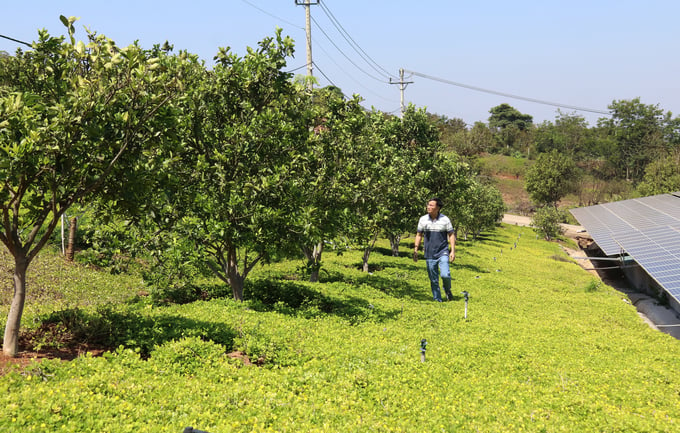
After being harvested, the mushroom embryos are composted into organic fertilizer for the surrounding orchards according to a circular model. Photo: Quang Yen.
Currently, the business is implementing green product certification and circular agriculture. The farm uses solar power above all machinery, which uses this energy source.
Regarding future development, Thanh Dong Green Food Joint Stock Company has registered with authorities to make the farm a local agricultural tourism attraction. This business is also continuing to build facilities and standards to be licensed to become Dak Lak's first agricultural tourism model. Currently, the company has also built a tour model. The enterprise has been visited by agricultural cooperatives inside and outside the province, as well as domestic and foreign enterprises, to see, learn about, and seek business opportunities.
Translated by Ha Phuc
![Advanced mariculture – an inevitable trend: [1] Moving offshore](https://t.ex-cdn.com/nongnghiepmoitruong.vn/608w/files/phucpm/2025/05/18/0252-2436-nuoi-bien-6-162148_783.jpg)
(VAN) Mariculture using advanced technology and moving offshore is an inevitable trend, as nearshore areas increasingly reveal limitations.

(VAN) South Korea is currently the second-largest investor in Hai Phong in terms of the number of projects (186 projects) and the largest in terms of total registered investment capital, reaching USD 14.2 billion.
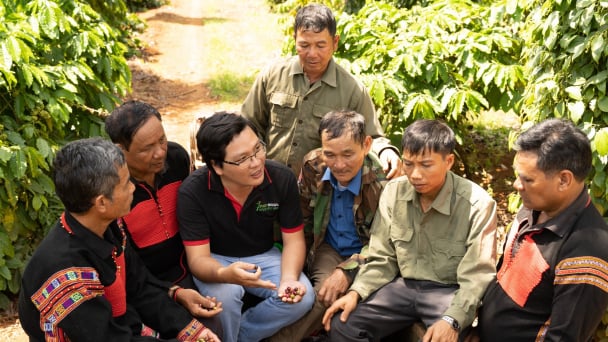
(VAN) As consumers become more environmentally conscious, legal regulations grow increasingly stringent...
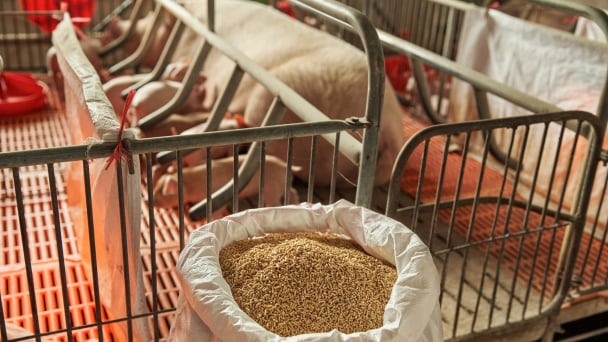
(VAN) CJ Feed&Care officially launched the FCR improvement campaign called “2025 Find Challenge Reach” in April 2025. In Vietnam, this campaign is implemented by CJ Vina Agri.
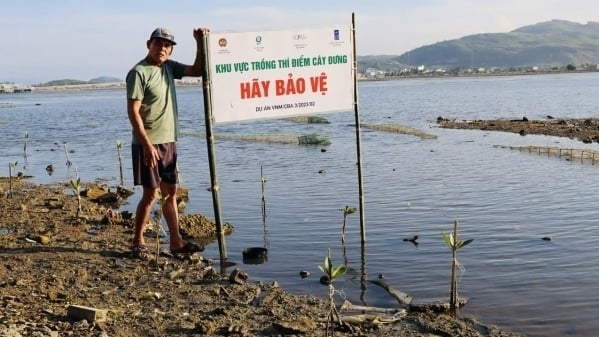
(VAN) The swamp in Pho Thanh is gradually being covered with red mangrove, creating a favorable environment for producing clean, high-quality salt.

(VAN) The trade turnover of agro-forestry-fishery products is growing significantly, along with investment cooperation commitments that are opening up new development directions between Vietnam and Russia.

(VAN) Khanh Hoa is investing over 545 billion VND to develop 240 hectares of high-tech marine aquaculture in order to guarantee a consistent supply of seafood exports and achieve the USD 1 billion target.